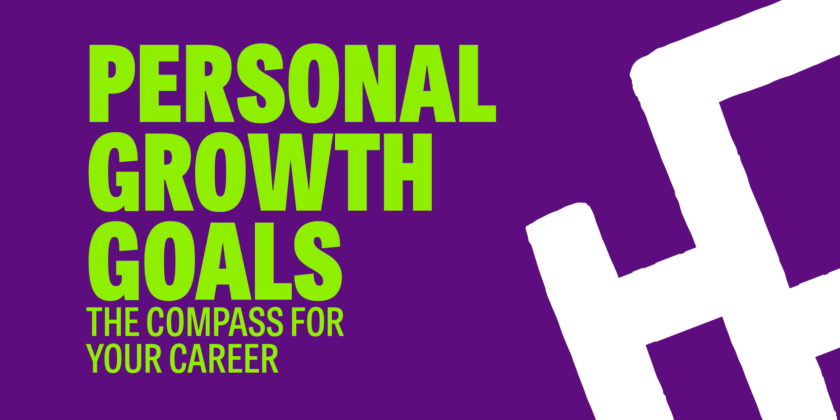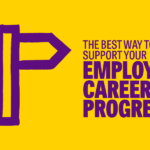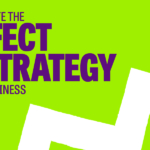“Success is not the key to happiness. Happiness is the key to success. If you love what you are doing, you will be successful.” – Albert Schweitzer
Our MD, Jo Taylor recently shared her thoughts on setting boring objectives and creating a divide between personal development goals and professional goals, and subsequently offering her thoughts on how alignment creates meaningful growth and career fulfilment. And I loved it! So, I wanted to take some time to build on her thinking and provide some insights and tips on, not only why personal growth goals are important, but also how managers can enable this alignment.
A big question I’ve been reflecting on is; how do we ensure personal growth goals aren’t just a “nice to have” but a powerful tool that transforms your career?
The truth is, personal growth isn’t a distraction from career success, it’s the compass guiding you there. When you actively prioritise growth (in all areas of your life), you can unlock creativity, resilience, and leadership skills that accelerate your career trajectory.
Let’s unpack how personal growth goals can fuel your career with science, actionable tips, and real strategies.
Why personal growth goals are essential for career success
- They fuel Emotional Intelligence (EQ):
Emotional Intelligence is the ability to recognise, understand, and manage your own emotions while effectively navigating the emotions of others. Personal growth goals naturally enhance EQ because they challenge you to reflect, adapt, and build self-awareness.
For example, pursuing a goal like improving mindfulness or learning how to give constructive feedback requires you to examine your emotional triggers, practice empathy, and refine communication skills. These efforts translate directly into the workplace, where EQ is critical for building trust, resolving conflicts, and inspiring collaboration.
Research shows that leaders with high EQ can increase their teams’ performance game by 20%. Personal growth goals provide the perfect framework to develop the self-awareness and interpersonal skills at the heart of EQ.
- They build mental toughness:
In my opinion, this is the real game-changer!
Mental toughness isn’t just about pushing through tough times—it’s about developing the grit and adaptability to thrive under pressure. Overcoming personal challenges, like running a marathon, committing to a fitness programme, or mastering a new skill, builds resilience by teaching you to embrace discomfort, learn from setbacks, and stay focused on your goals.
This level of mental fitness doesn’t just help you survive workplace pressures—it empowers you to rise above them. Whether you’re navigating tight deadlines, leading challenging projects, or making high-stakes decisions, the discipline and determination you create through personal growth become the foundation for professional success.
- Personal growth goals enhance creativity and problem-solving:
Personal growth activities like journaling, learning a new language or exploring hobbies stimulate neuroplasticity, your brain’s ability to form new connections. This enhances creativity by helping you approach challenges with fresh perspectives and enables better problem-solving.
Research shows that engaging in mentally challenging activities improves cognitive flexibility, a key component of both creativity and decision-making.
Journaling, for example, boosts emotional clarity, which helps in tackling complex problems.
- They keep you motivated:
Motivation isn’t just about ticking off your laundry list, it’s about staying energised by what truly matters. Intrinsic motivation—the drive fueled by personal fulfilment—leads to sustained performance, especially in demanding environments.
More importantly, it taps into your brain’s reward system, releasing dopamine when you achieve meaningful milestones. Over time, this rewires your mindset to see challenges as opportunities rather than obstacles, sustaining your momentum for long-term growth
Aligning personal growth goals with career success
To get this right, you need to view your career not as a series of separate roles or tasks, but as part of your broader life story. The alignment happens when your growth goals reflect the kind of person you want to become, not just the professional you’re trying to be.
Think of it this way: Your career is the vehicle, but personal growth is the fuel. Without growth, your career eventually stalls. And without direction, growth feels aimless. When you bring these two elements together, you’re building a framework for long-term fulfilment and success.
And as managers, you have a huge role to play in helping your people uncover this alignment and bring it to life in their day-to-day. Let me show you how.
The framework for alignment: Purpose, Priorities, and Performance
To align your personal development goals with your career, focus on these three pillars:
- Purpose:
Your purpose is your compass. It’s not just your “why” but your “where.” Where do you want your career to take you? Where do you see yourself growing in life? Start by asking yourself:- What am I passionate about solving, learning, or contributing to?
- What kind of impact do I want to have on others, both in my career and personal life?
Take action now: Write down a sentence that captures your purpose
As a manager, help individuals connect their passions with their work.
Ask questions like:
- What motivates you most?
- What impact do you want to make?
- If someone is passionate about mentoring, involve them in onboarding new hires.
- If sustainability excites them, encourage participation in ESG initiatives.
Highlight how their strengths align with team or organisational goals.
- Priorities:
Once your purpose is clear, identify what truly matters right now. Misaligned goals often stem from trying to do everything at once. Focus on the areas that will have the biggest ripple effect on your career and personal growth.
Take action now: Use the Eisenhower Matrix to map out what’s urgent versus what’s important. Prioritise goals that fall into the “important but not urgent” category—they’re the ones that deliver long-term value.
Managers must constantly walk the tightrope of helping their people navigate competing priorities. Managers can step in to co-create goals that align with individual growth aspirations and team objectives and ensure that their teams have the headspace, time and resources needed to lean into growth opportunities.
- Performance:
Personal growth goals aren’t just about ideas, they’re about execution. This is where you translate purpose and priorities into consistent action. But here’s the trick: High performance comes from small, sustainable steps, not massive overhauls.
And this is where personal effectiveness becomes a game-changer. By honing your ability to manage time, energy, and focus, you can consistently deliver on your goals without feeling overwhelmed. Personal effectiveness isn’t just a skill—it’s the foundation for turning personal development plans into reality.
Take action now: Explore our Personal Effectiveness Cards for practical tips and exercises to help you manage your energy and focus more effectively.
By mastering personal effectiveness, you not only increase your chances of achieving your growth goals but also create a ripple effect of confidence and clarity in every area of your life.
However, the best growth plans are useless without follow-through. Managers must create an environment that supports consistent action and accountability.
- Provide regular check-ins to assess progress on growth goals and provide constructive feedback.
- Celebrate progress, not just outcomes to sustain motivation.
- Whether it’s access to training, connecting employees with a mentor, or providing tools for time management, managers can remove barriers to action.
And if you want to take immediate action, run our How to Improve Personal Effectiveness Workshop—designed to equip teams with tools to perform at their best, together.
I suppose what I’m trying to say is, forget trying to “balance” personal development goals and career goals. The real magic happens when you integrate the two as Jo explains in her blog. Integration means finding ways for your goals to naturally overlap, creating synergy rather than competition.
Here are some deeper questions to consider as you align your goals:
- What kind of person do I want to be in 5 years, and how does my career support that vision?
- What habits or skills could I develop now that would open doors for me later?
- What’s one thing I’m doing today that doesn’t align with my bigger picture?
- How do I define success beyond just professional achievements?
As much as individuals are responsible for aligning their personal growth with career success, managers play a crucial role in enabling and empowering their team members to do so.
Here are some reflection questions for managers to ask themselves:
- How well do I understand the personal and professional aspirations of my team members?
- Am I creating enough opportunities for my team to grow and align their goals with business needs?
- Do I celebrate progress and growth, or only the final outcomes?
- How can I model the integration of personal growth and career success in my leadership?
Managers are uniquely positioned to provide the tools, feedback, and opportunities that make this alignment achievable and sustainable.
Growth is the goal!
True alignment isn’t about having the perfect plan. It’s about progress. When your personal growth goals serve both your personal development and career aspirations, you’re not just working toward a promotion or milestone—you’re shaping the person you’re becoming along the way.
So, instead of asking, “What do I need to do to get ahead?” ask yourself, “How can I grow to create the career and life I want?”
The answer will lead you to goals that aren’t just aligned—they’re transformative.
The payoff: A career with purpose and fulfilment
As Simon Sinek says:
“Working hard for something we don’t care about is stress; working hard for something we love is passion.”
Your career isn’t separate from your personal growth—it’s shaped by it. When you set dual-impact goals that align your aspirations with your professional ambitions, you create a path that leads to lasting success and fulfilment.
If you’re ready to take your career to the next level or you’re a manager who wants to enable their team to achieve career success, consider exploring career coaching.
A career coach can help:
- Clarify your purpose and priorities.
- Identify opportunities to align personal growth with career goals.
- Create actionable, tailored strategies to unlock your potential.
For managers:
Career coaching isn’t just about individual success, it’s about creating a culture of growth within your team. Coaching can equip you to:
- Support your team in setting meaningful goals.
- Create alignment between individual aspirations and business needs.
- Build engagement, resilience, and high performance.
Whether you’re navigating a career transition, striving for clarity, or leading a team toward greater success, career coaching provides the tools and guidance to help you thrive.
Explore our coaching services and take the first step toward an aligned career and empowered team!



